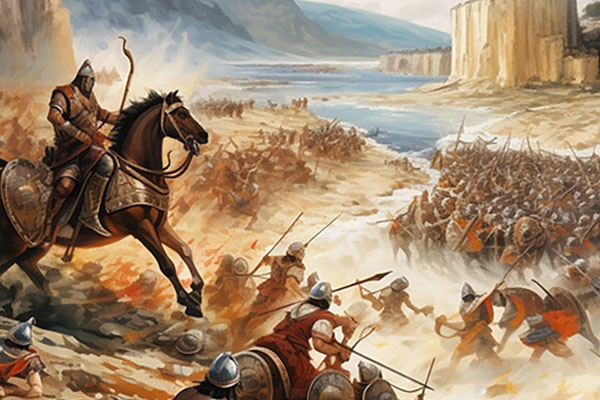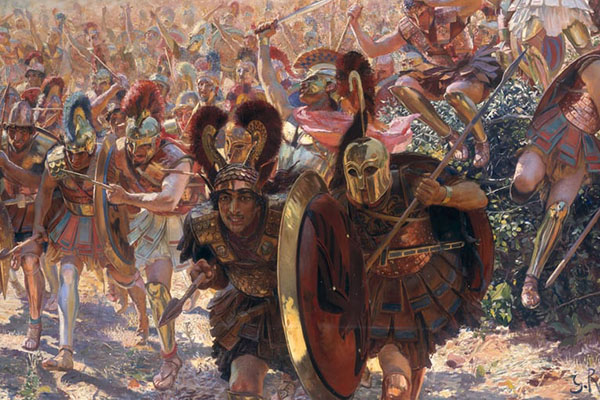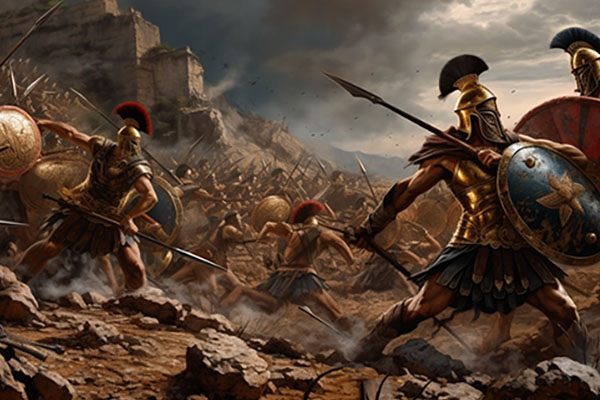The initial Persian invasion of Greece unfolded in 492 BC during the Greco-Persian Wars, culminating in the Battle of Marathon in 490 BC. King Darius the Great orchestrated the campaigns with the primary objectives of punishing Athens and Eretria for their support of the Ionian cities' revolt and expanding the Persian Empire into Europe.
II. First Campaign (492 BC): Led by Mardonius, the first campaign successfully re-subjugated Thrace and made Macedon a Persian client kingdom. However, progress was hindered when Mardonius' fleet encountered a storm off Mount Athos. Despite this setback, Darius, having received submission from most Greek city-states, faced resistance from Athens and Sparta.
III. Demand for Submission: In 491 BC, Darius, demonstrating his intentions, sent ambassadors demanding submission from all Greek city-states. Athens and Sparta, defiant in their stance, executed the Persian ambassadors, leading to heightened tensions and the anticipation of further conflict.
IV. Second Campaign (490 BC): Under the command of Datis and Artaphernes, the second campaign in 490 BC aimed to capture Naxos, annex the Cycladic Islands, and punish Eretria. The Persian forces, en route to Athens, faced a smaller Athenian army at Marathon. Despite being outnumbered, the Athenians secured a remarkable victory at the Battle of Marathon, thwarting the immediate success of the Persian invasion.
V. Achievements and Unfinished Business: Although the Battle of Marathon prevented the Persian campaign's conclusive success, the expedition achieved its goals by punishing Naxos and Eretria and extending Persian rule in the Aegean. The unfinished business from this campaign set the stage for Darius to prepare a more substantial invasion to firmly subjugate Greece and punish Athens and Sparta.
VI. Delay and Succession: Internal strife within the Persian Empire and Darius's death from old age postponed the larger invasion. The responsibility fell to his son, Xerxes I, who would later lead the second Persian invasion of Greece in 480 BC.
| Start Date | 493 BC |
|---|---|
| End Date | 493 BC |

Did you
know?
Did you know? The Battle of Marathon marked the First Persian Invasion's pivotal moment, inspiring the marathon race tradition.
Wars
View allALLFurther Reading
Art &
Architecture
Ancient Greek art and architecture, with its harmonious proportions and timeless elegance, continue to inspire awe and admiration millennia later.
Discover
Greek Mythology & Mythical Characters
Greek mythology, a rich tapestry of gods, heroes, and mythical creatures, captivates the imagination with its tales of love, betrayal, and epic adventures that delve into the depths of the human psyche.
Discover
Ancient Greek History
Ancient Greek history, marked by remarkable achievements in democracy, philosophy, and warfare, shaped the foundation of Western civilization, leaving an indelible legacy of innovation and cultural influence that continues to resonate to this day.
Discover
Ancient Greek Olympics
The ancient Greek Olympics, held in Olympia every four years, celebrated athleticism, unity, and cultural pride, serving as a testament to the enduring spirit of competition and excellence that transcends time and borders.
Discover
Ancient Greek Wars
Ancient Greek wars, such as the Persian Wars and the Peloponnesian War, were pivotal conflicts that shaped the course of history, highlighting the struggle for power, independence, and the clash of civilizations in the ancient Mediterranean world.
Discover
Ancient Greek Culture and Society
Ancient Greek culture and society, characterized by its emphasis on art, philosophy, and civic engagement, fostered a vibrant intellectual and social landscape where innovation flourished, democracy thrived, and the pursuit of knowledge and excellence was celebrated as fundamental values of civilized life.
Discover


